Healthcare Assignment: Literature Review on Diabetes Self-Management
VerifiedAdded on 2022/10/04
|9
|2393
|19
Report
AI Summary
This healthcare assignment provides a comprehensive literature review on the effectiveness of group education in diabetes self-management. It explores the impact of group-based interventions on clinical, lifestyle, and psychosocial outcomes for individuals with Type 2 diabetes, referencing key studies and the Chronic Care Model. The review considers diverse patient groups and identifies elements of the approach that align with the chronic care model, as well as areas that are more biomedical in their approach. The report emphasizes the importance of culturally competent communication and education, equal distribution of resources, and promotion of collaborative behavior. The assignment concludes with recommendations for the Australian Diabetes Educators Association, focusing on the use of culturally competent approaches and the need for appropriate knowledge transfer to all individuals within a social or cultural group. The review highlights the importance of respectful relationships and non-verbal communication, as well as the use of a collaborative approach.
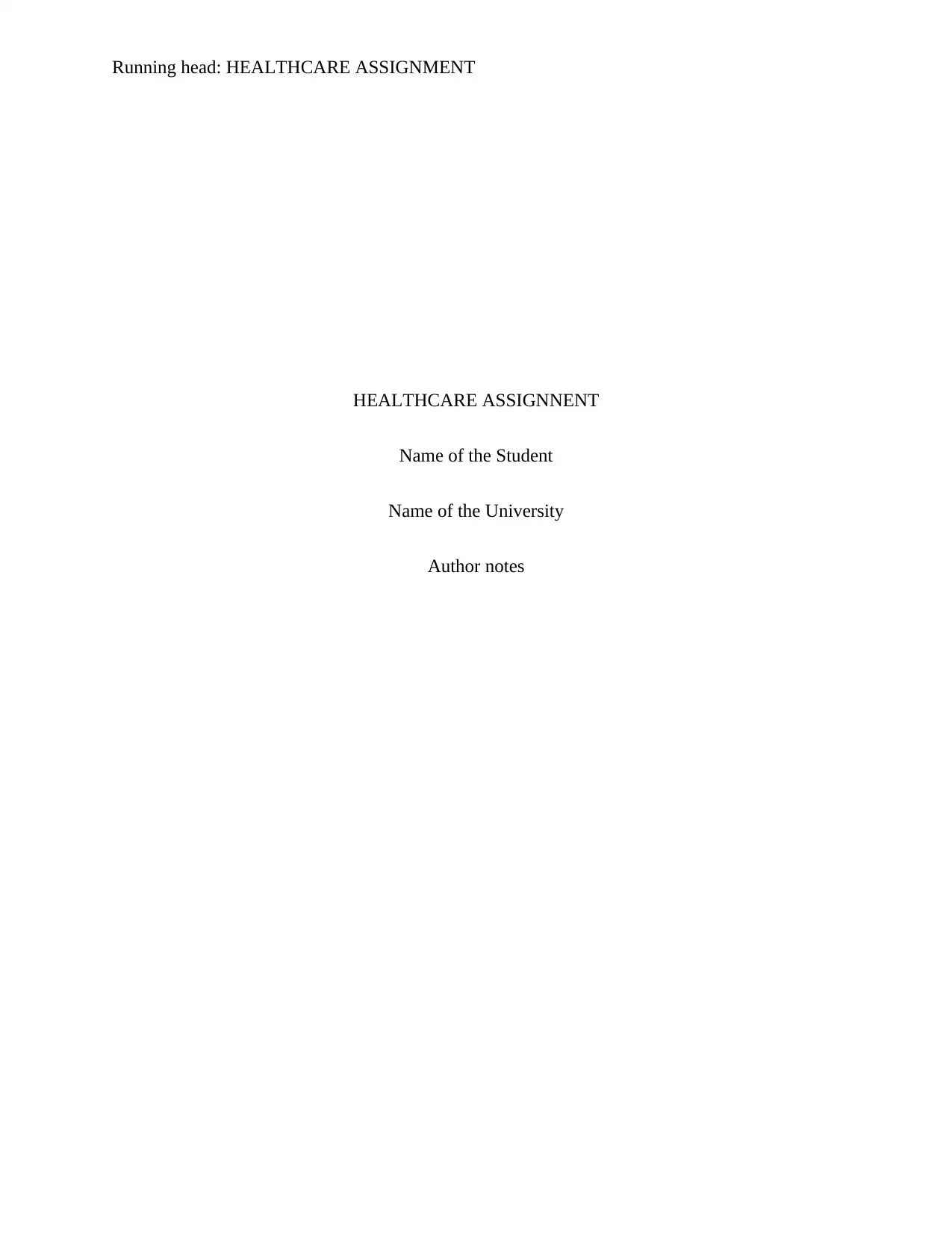
Running head: HEALTHCARE ASSIGNMENT
HEALTHCARE ASSIGNNENT
Name of the Student
Name of the University
Author notes
HEALTHCARE ASSIGNNENT
Name of the Student
Name of the University
Author notes
Paraphrase This Document
Need a fresh take? Get an instant paraphrase of this document with our AI Paraphraser
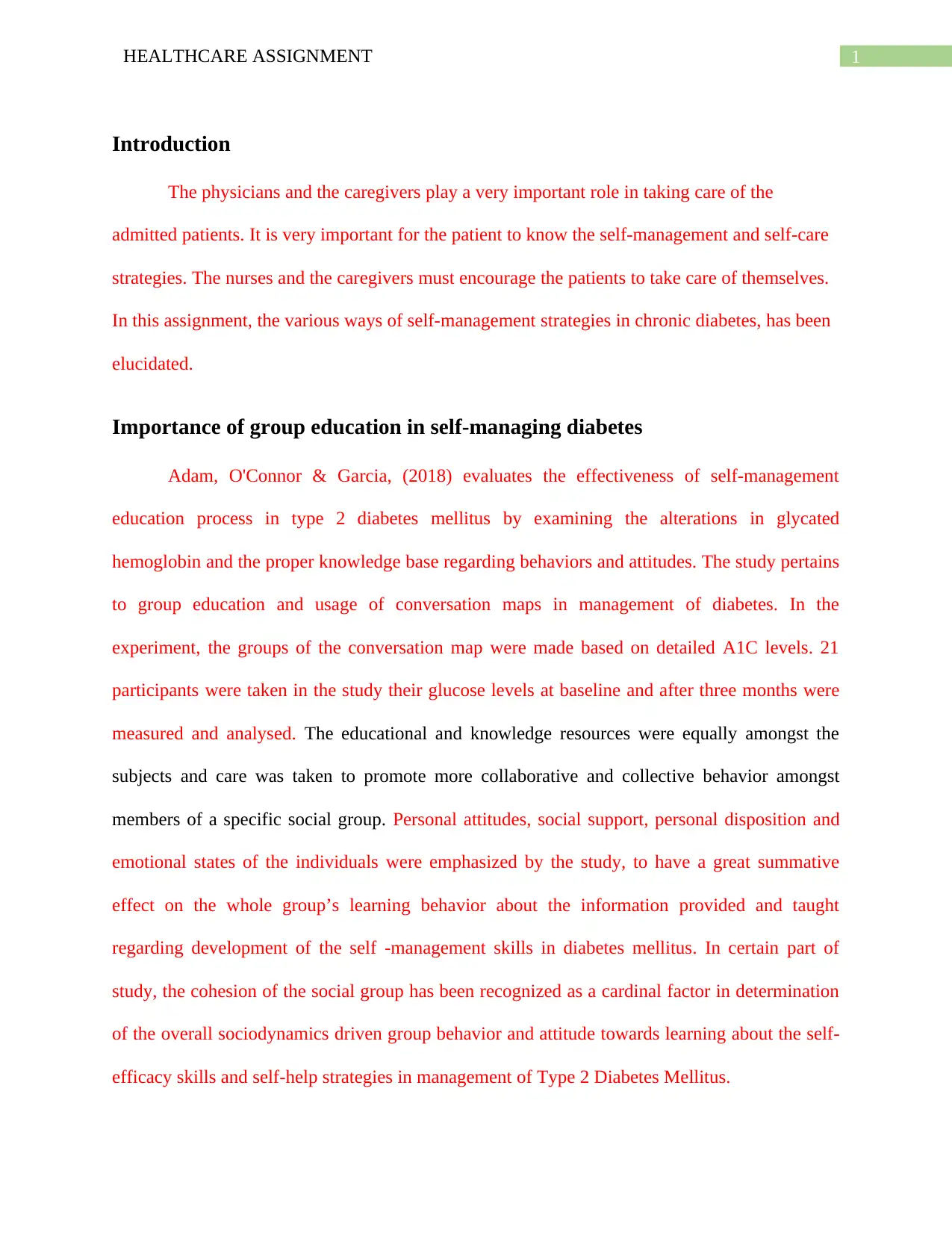
1HEALTHCARE ASSIGNMENT
Introduction
The physicians and the caregivers play a very important role in taking care of the
admitted patients. It is very important for the patient to know the self-management and self-care
strategies. The nurses and the caregivers must encourage the patients to take care of themselves.
In this assignment, the various ways of self-management strategies in chronic diabetes, has been
elucidated.
Importance of group education in self-managing diabetes
Adam, O'Connor & Garcia, (2018) evaluates the effectiveness of self-management
education process in type 2 diabetes mellitus by examining the alterations in glycated
hemoglobin and the proper knowledge base regarding behaviors and attitudes. The study pertains
to group education and usage of conversation maps in management of diabetes. In the
experiment, the groups of the conversation map were made based on detailed A1C levels. 21
participants were taken in the study their glucose levels at baseline and after three months were
measured and analysed. The educational and knowledge resources were equally amongst the
subjects and care was taken to promote more collaborative and collective behavior amongst
members of a specific social group. Personal attitudes, social support, personal disposition and
emotional states of the individuals were emphasized by the study, to have a great summative
effect on the whole group’s learning behavior about the information provided and taught
regarding development of the self -management skills in diabetes mellitus. In certain part of
study, the cohesion of the social group has been recognized as a cardinal factor in determination
of the overall sociodynamics driven group behavior and attitude towards learning about the self-
efficacy skills and self-help strategies in management of Type 2 Diabetes Mellitus.
Introduction
The physicians and the caregivers play a very important role in taking care of the
admitted patients. It is very important for the patient to know the self-management and self-care
strategies. The nurses and the caregivers must encourage the patients to take care of themselves.
In this assignment, the various ways of self-management strategies in chronic diabetes, has been
elucidated.
Importance of group education in self-managing diabetes
Adam, O'Connor & Garcia, (2018) evaluates the effectiveness of self-management
education process in type 2 diabetes mellitus by examining the alterations in glycated
hemoglobin and the proper knowledge base regarding behaviors and attitudes. The study pertains
to group education and usage of conversation maps in management of diabetes. In the
experiment, the groups of the conversation map were made based on detailed A1C levels. 21
participants were taken in the study their glucose levels at baseline and after three months were
measured and analysed. The educational and knowledge resources were equally amongst the
subjects and care was taken to promote more collaborative and collective behavior amongst
members of a specific social group. Personal attitudes, social support, personal disposition and
emotional states of the individuals were emphasized by the study, to have a great summative
effect on the whole group’s learning behavior about the information provided and taught
regarding development of the self -management skills in diabetes mellitus. In certain part of
study, the cohesion of the social group has been recognized as a cardinal factor in determination
of the overall sociodynamics driven group behavior and attitude towards learning about the self-
efficacy skills and self-help strategies in management of Type 2 Diabetes Mellitus.
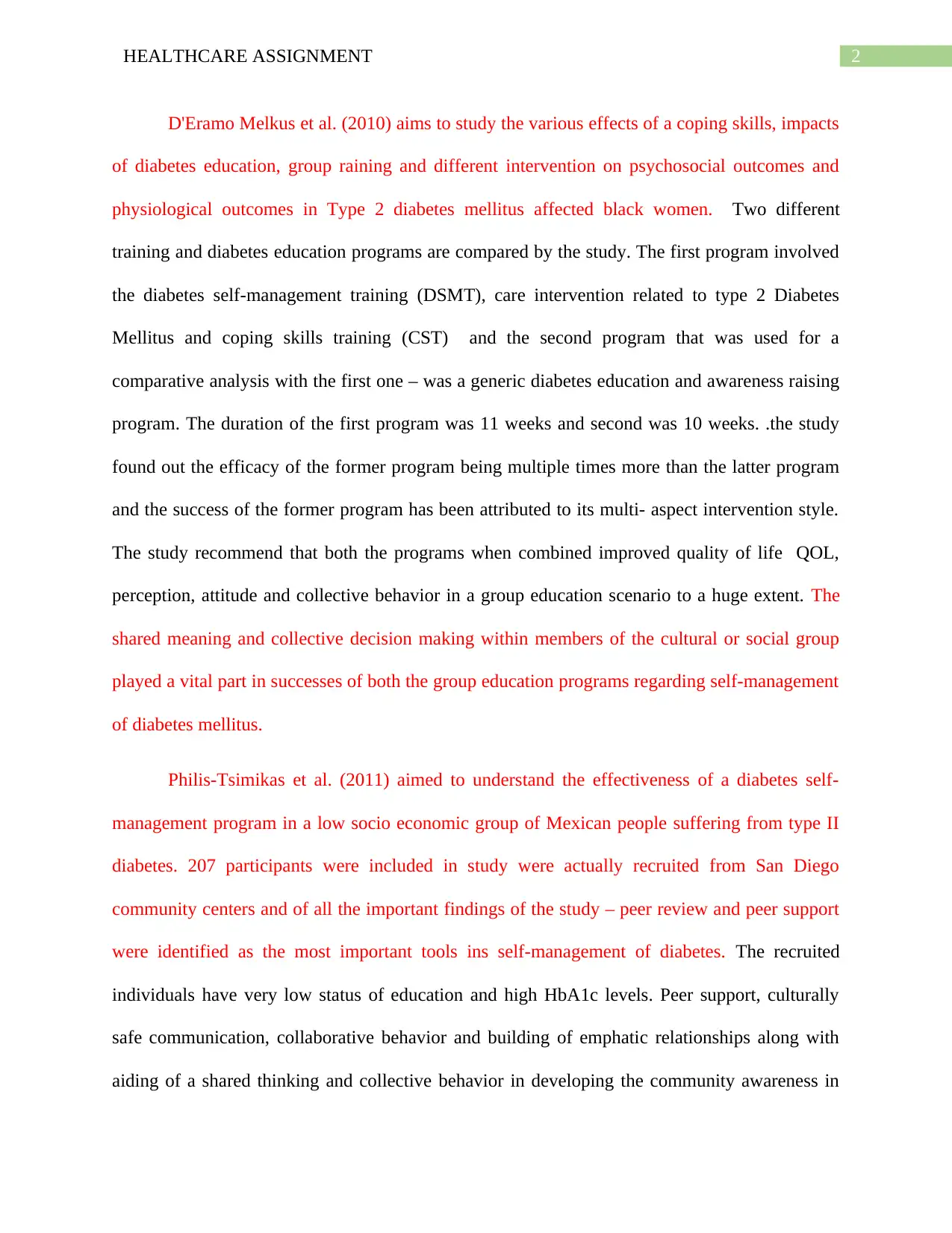
2HEALTHCARE ASSIGNMENT
D'Eramo Melkus et al. (2010) aims to study the various effects of a coping skills, impacts
of diabetes education, group raining and different intervention on psychosocial outcomes and
physiological outcomes in Type 2 diabetes mellitus affected black women. Two different
training and diabetes education programs are compared by the study. The first program involved
the diabetes self-management training (DSMT), care intervention related to type 2 Diabetes
Mellitus and coping skills training (CST) and the second program that was used for a
comparative analysis with the first one – was a generic diabetes education and awareness raising
program. The duration of the first program was 11 weeks and second was 10 weeks. .the study
found out the efficacy of the former program being multiple times more than the latter program
and the success of the former program has been attributed to its multi- aspect intervention style.
The study recommend that both the programs when combined improved quality of life QOL,
perception, attitude and collective behavior in a group education scenario to a huge extent. The
shared meaning and collective decision making within members of the cultural or social group
played a vital part in successes of both the group education programs regarding self-management
of diabetes mellitus.
Philis-Tsimikas et al. (2011) aimed to understand the effectiveness of a diabetes self-
management program in a low socio economic group of Mexican people suffering from type II
diabetes. 207 participants were included in study were actually recruited from San Diego
community centers and of all the important findings of the study – peer review and peer support
were identified as the most important tools ins self-management of diabetes. The recruited
individuals have very low status of education and high HbA1c levels. Peer support, culturally
safe communication, collaborative behavior and building of emphatic relationships along with
aiding of a shared thinking and collective behavior in developing the community awareness in
D'Eramo Melkus et al. (2010) aims to study the various effects of a coping skills, impacts
of diabetes education, group raining and different intervention on psychosocial outcomes and
physiological outcomes in Type 2 diabetes mellitus affected black women. Two different
training and diabetes education programs are compared by the study. The first program involved
the diabetes self-management training (DSMT), care intervention related to type 2 Diabetes
Mellitus and coping skills training (CST) and the second program that was used for a
comparative analysis with the first one – was a generic diabetes education and awareness raising
program. The duration of the first program was 11 weeks and second was 10 weeks. .the study
found out the efficacy of the former program being multiple times more than the latter program
and the success of the former program has been attributed to its multi- aspect intervention style.
The study recommend that both the programs when combined improved quality of life QOL,
perception, attitude and collective behavior in a group education scenario to a huge extent. The
shared meaning and collective decision making within members of the cultural or social group
played a vital part in successes of both the group education programs regarding self-management
of diabetes mellitus.
Philis-Tsimikas et al. (2011) aimed to understand the effectiveness of a diabetes self-
management program in a low socio economic group of Mexican people suffering from type II
diabetes. 207 participants were included in study were actually recruited from San Diego
community centers and of all the important findings of the study – peer review and peer support
were identified as the most important tools ins self-management of diabetes. The recruited
individuals have very low status of education and high HbA1c levels. Peer support, culturally
safe communication, collaborative behavior and building of emphatic relationships along with
aiding of a shared thinking and collective behavior in developing the community awareness in
⊘ This is a preview!⊘
Do you want full access?
Subscribe today to unlock all pages.

Trusted by 1+ million students worldwide
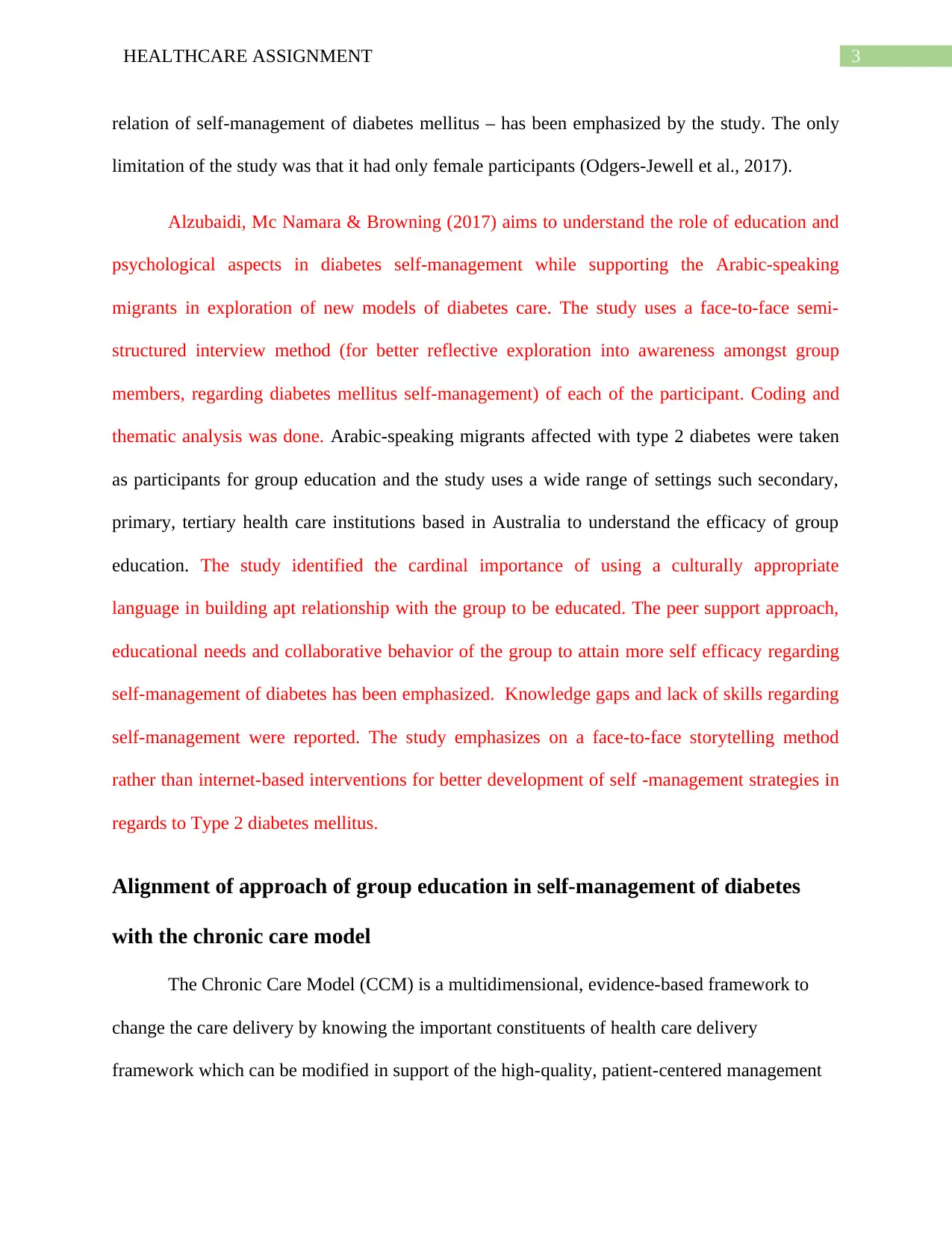
3HEALTHCARE ASSIGNMENT
relation of self-management of diabetes mellitus – has been emphasized by the study. The only
limitation of the study was that it had only female participants (Odgers‐Jewell et al., 2017).
Alzubaidi, Mc Namara & Browning (2017) aims to understand the role of education and
psychological aspects in diabetes self-management while supporting the Arabic-speaking
migrants in exploration of new models of diabetes care. The study uses a face-to-face semi-
structured interview method (for better reflective exploration into awareness amongst group
members, regarding diabetes mellitus self-management) of each of the participant. Coding and
thematic analysis was done. Arabic-speaking migrants affected with type 2 diabetes were taken
as participants for group education and the study uses a wide range of settings such secondary,
primary, tertiary health care institutions based in Australia to understand the efficacy of group
education. The study identified the cardinal importance of using a culturally appropriate
language in building apt relationship with the group to be educated. The peer support approach,
educational needs and collaborative behavior of the group to attain more self efficacy regarding
self-management of diabetes has been emphasized. Knowledge gaps and lack of skills regarding
self-management were reported. The study emphasizes on a face-to-face storytelling method
rather than internet-based interventions for better development of self -management strategies in
regards to Type 2 diabetes mellitus.
Alignment of approach of group education in self-management of diabetes
with the chronic care model
The Chronic Care Model (CCM) is a multidimensional, evidence-based framework to
change the care delivery by knowing the important constituents of health care delivery
framework which can be modified in support of the high-quality, patient-centered management
relation of self-management of diabetes mellitus – has been emphasized by the study. The only
limitation of the study was that it had only female participants (Odgers‐Jewell et al., 2017).
Alzubaidi, Mc Namara & Browning (2017) aims to understand the role of education and
psychological aspects in diabetes self-management while supporting the Arabic-speaking
migrants in exploration of new models of diabetes care. The study uses a face-to-face semi-
structured interview method (for better reflective exploration into awareness amongst group
members, regarding diabetes mellitus self-management) of each of the participant. Coding and
thematic analysis was done. Arabic-speaking migrants affected with type 2 diabetes were taken
as participants for group education and the study uses a wide range of settings such secondary,
primary, tertiary health care institutions based in Australia to understand the efficacy of group
education. The study identified the cardinal importance of using a culturally appropriate
language in building apt relationship with the group to be educated. The peer support approach,
educational needs and collaborative behavior of the group to attain more self efficacy regarding
self-management of diabetes has been emphasized. Knowledge gaps and lack of skills regarding
self-management were reported. The study emphasizes on a face-to-face storytelling method
rather than internet-based interventions for better development of self -management strategies in
regards to Type 2 diabetes mellitus.
Alignment of approach of group education in self-management of diabetes
with the chronic care model
The Chronic Care Model (CCM) is a multidimensional, evidence-based framework to
change the care delivery by knowing the important constituents of health care delivery
framework which can be modified in support of the high-quality, patient-centered management
Paraphrase This Document
Need a fresh take? Get an instant paraphrase of this document with our AI Paraphraser
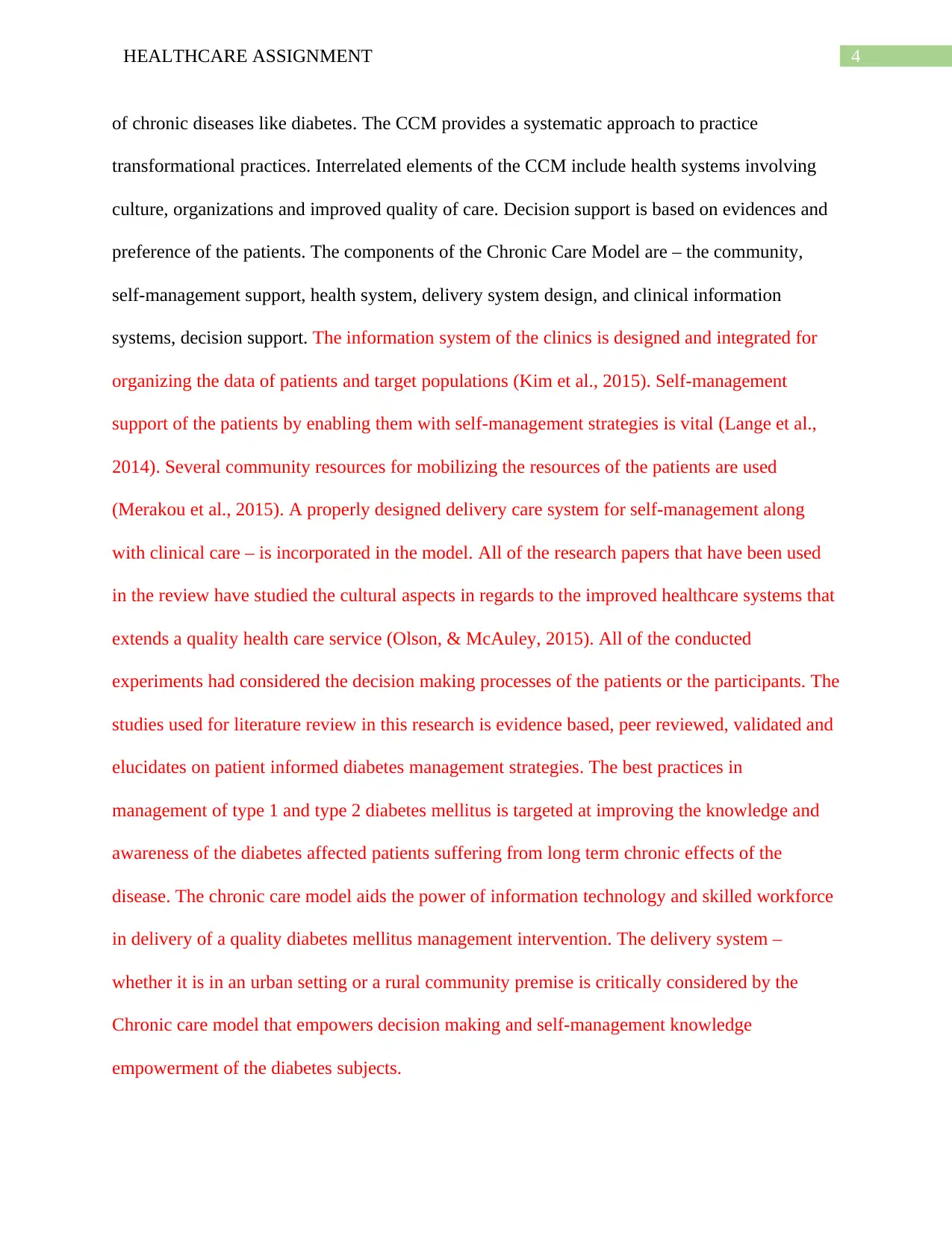
4HEALTHCARE ASSIGNMENT
of chronic diseases like diabetes. The CCM provides a systematic approach to practice
transformational practices. Interrelated elements of the CCM include health systems involving
culture, organizations and improved quality of care. Decision support is based on evidences and
preference of the patients. The components of the Chronic Care Model are – the community,
self-management support, health system, delivery system design, and clinical information
systems, decision support. The information system of the clinics is designed and integrated for
organizing the data of patients and target populations (Kim et al., 2015). Self-management
support of the patients by enabling them with self-management strategies is vital (Lange et al.,
2014). Several community resources for mobilizing the resources of the patients are used
(Merakou et al., 2015). A properly designed delivery care system for self-management along
with clinical care – is incorporated in the model. All of the research papers that have been used
in the review have studied the cultural aspects in regards to the improved healthcare systems that
extends a quality health care service (Olson, & McAuley, 2015). All of the conducted
experiments had considered the decision making processes of the patients or the participants. The
studies used for literature review in this research is evidence based, peer reviewed, validated and
elucidates on patient informed diabetes management strategies. The best practices in
management of type 1 and type 2 diabetes mellitus is targeted at improving the knowledge and
awareness of the diabetes affected patients suffering from long term chronic effects of the
disease. The chronic care model aids the power of information technology and skilled workforce
in delivery of a quality diabetes mellitus management intervention. The delivery system –
whether it is in an urban setting or a rural community premise is critically considered by the
Chronic care model that empowers decision making and self-management knowledge
empowerment of the diabetes subjects.
of chronic diseases like diabetes. The CCM provides a systematic approach to practice
transformational practices. Interrelated elements of the CCM include health systems involving
culture, organizations and improved quality of care. Decision support is based on evidences and
preference of the patients. The components of the Chronic Care Model are – the community,
self-management support, health system, delivery system design, and clinical information
systems, decision support. The information system of the clinics is designed and integrated for
organizing the data of patients and target populations (Kim et al., 2015). Self-management
support of the patients by enabling them with self-management strategies is vital (Lange et al.,
2014). Several community resources for mobilizing the resources of the patients are used
(Merakou et al., 2015). A properly designed delivery care system for self-management along
with clinical care – is incorporated in the model. All of the research papers that have been used
in the review have studied the cultural aspects in regards to the improved healthcare systems that
extends a quality health care service (Olson, & McAuley, 2015). All of the conducted
experiments had considered the decision making processes of the patients or the participants. The
studies used for literature review in this research is evidence based, peer reviewed, validated and
elucidates on patient informed diabetes management strategies. The best practices in
management of type 1 and type 2 diabetes mellitus is targeted at improving the knowledge and
awareness of the diabetes affected patients suffering from long term chronic effects of the
disease. The chronic care model aids the power of information technology and skilled workforce
in delivery of a quality diabetes mellitus management intervention. The delivery system –
whether it is in an urban setting or a rural community premise is critically considered by the
Chronic care model that empowers decision making and self-management knowledge
empowerment of the diabetes subjects.
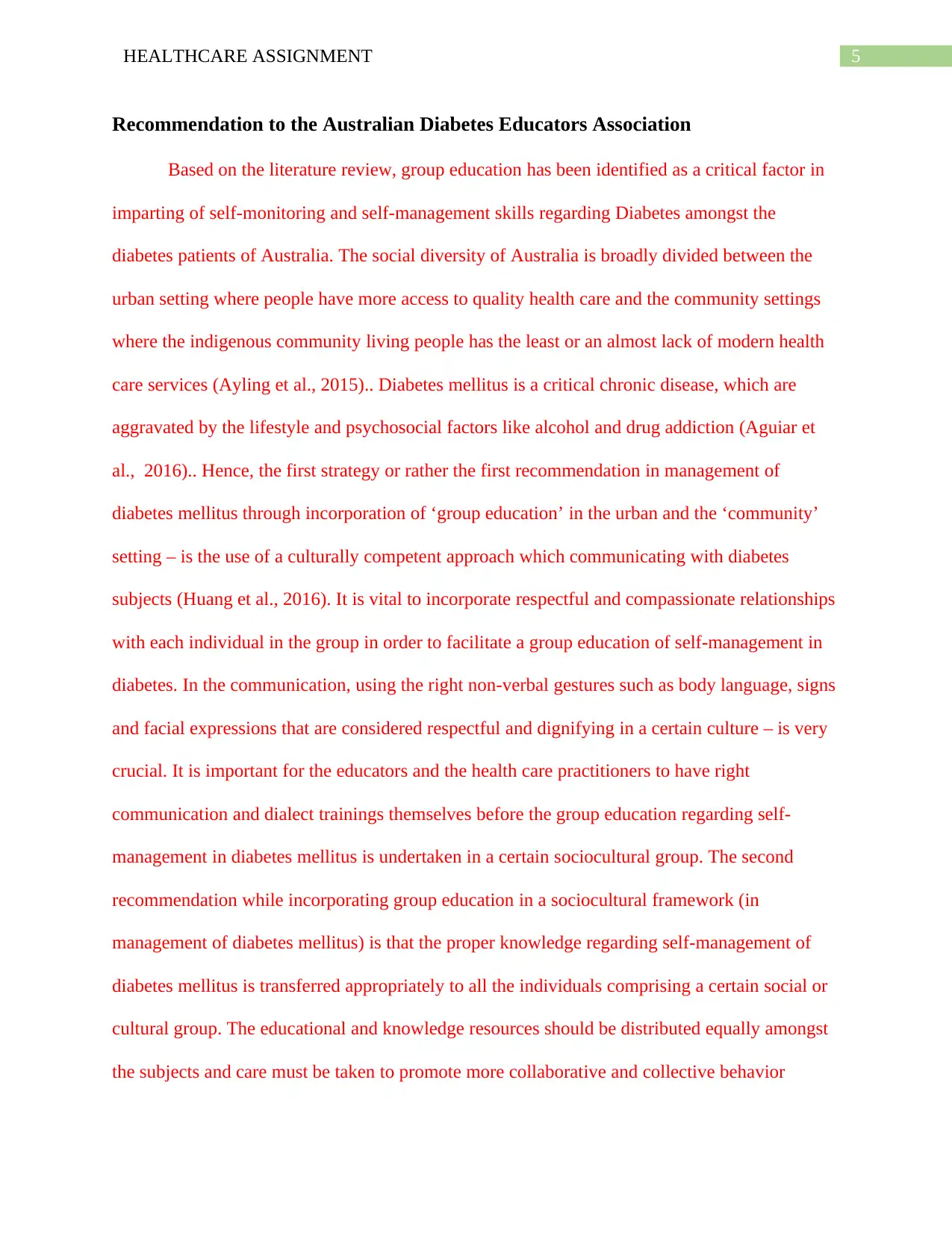
5HEALTHCARE ASSIGNMENT
Recommendation to the Australian Diabetes Educators Association
Based on the literature review, group education has been identified as a critical factor in
imparting of self-monitoring and self-management skills regarding Diabetes amongst the
diabetes patients of Australia. The social diversity of Australia is broadly divided between the
urban setting where people have more access to quality health care and the community settings
where the indigenous community living people has the least or an almost lack of modern health
care services (Ayling et al., 2015).. Diabetes mellitus is a critical chronic disease, which are
aggravated by the lifestyle and psychosocial factors like alcohol and drug addiction (Aguiar et
al., 2016).. Hence, the first strategy or rather the first recommendation in management of
diabetes mellitus through incorporation of ‘group education’ in the urban and the ‘community’
setting – is the use of a culturally competent approach which communicating with diabetes
subjects (Huang et al., 2016). It is vital to incorporate respectful and compassionate relationships
with each individual in the group in order to facilitate a group education of self-management in
diabetes. In the communication, using the right non-verbal gestures such as body language, signs
and facial expressions that are considered respectful and dignifying in a certain culture – is very
crucial. It is important for the educators and the health care practitioners to have right
communication and dialect trainings themselves before the group education regarding self-
management in diabetes mellitus is undertaken in a certain sociocultural group. The second
recommendation while incorporating group education in a sociocultural framework (in
management of diabetes mellitus) is that the proper knowledge regarding self-management of
diabetes mellitus is transferred appropriately to all the individuals comprising a certain social or
cultural group. The educational and knowledge resources should be distributed equally amongst
the subjects and care must be taken to promote more collaborative and collective behavior
Recommendation to the Australian Diabetes Educators Association
Based on the literature review, group education has been identified as a critical factor in
imparting of self-monitoring and self-management skills regarding Diabetes amongst the
diabetes patients of Australia. The social diversity of Australia is broadly divided between the
urban setting where people have more access to quality health care and the community settings
where the indigenous community living people has the least or an almost lack of modern health
care services (Ayling et al., 2015).. Diabetes mellitus is a critical chronic disease, which are
aggravated by the lifestyle and psychosocial factors like alcohol and drug addiction (Aguiar et
al., 2016).. Hence, the first strategy or rather the first recommendation in management of
diabetes mellitus through incorporation of ‘group education’ in the urban and the ‘community’
setting – is the use of a culturally competent approach which communicating with diabetes
subjects (Huang et al., 2016). It is vital to incorporate respectful and compassionate relationships
with each individual in the group in order to facilitate a group education of self-management in
diabetes. In the communication, using the right non-verbal gestures such as body language, signs
and facial expressions that are considered respectful and dignifying in a certain culture – is very
crucial. It is important for the educators and the health care practitioners to have right
communication and dialect trainings themselves before the group education regarding self-
management in diabetes mellitus is undertaken in a certain sociocultural group. The second
recommendation while incorporating group education in a sociocultural framework (in
management of diabetes mellitus) is that the proper knowledge regarding self-management of
diabetes mellitus is transferred appropriately to all the individuals comprising a certain social or
cultural group. The educational and knowledge resources should be distributed equally amongst
the subjects and care must be taken to promote more collaborative and collective behavior
⊘ This is a preview!⊘
Do you want full access?
Subscribe today to unlock all pages.

Trusted by 1+ million students worldwide
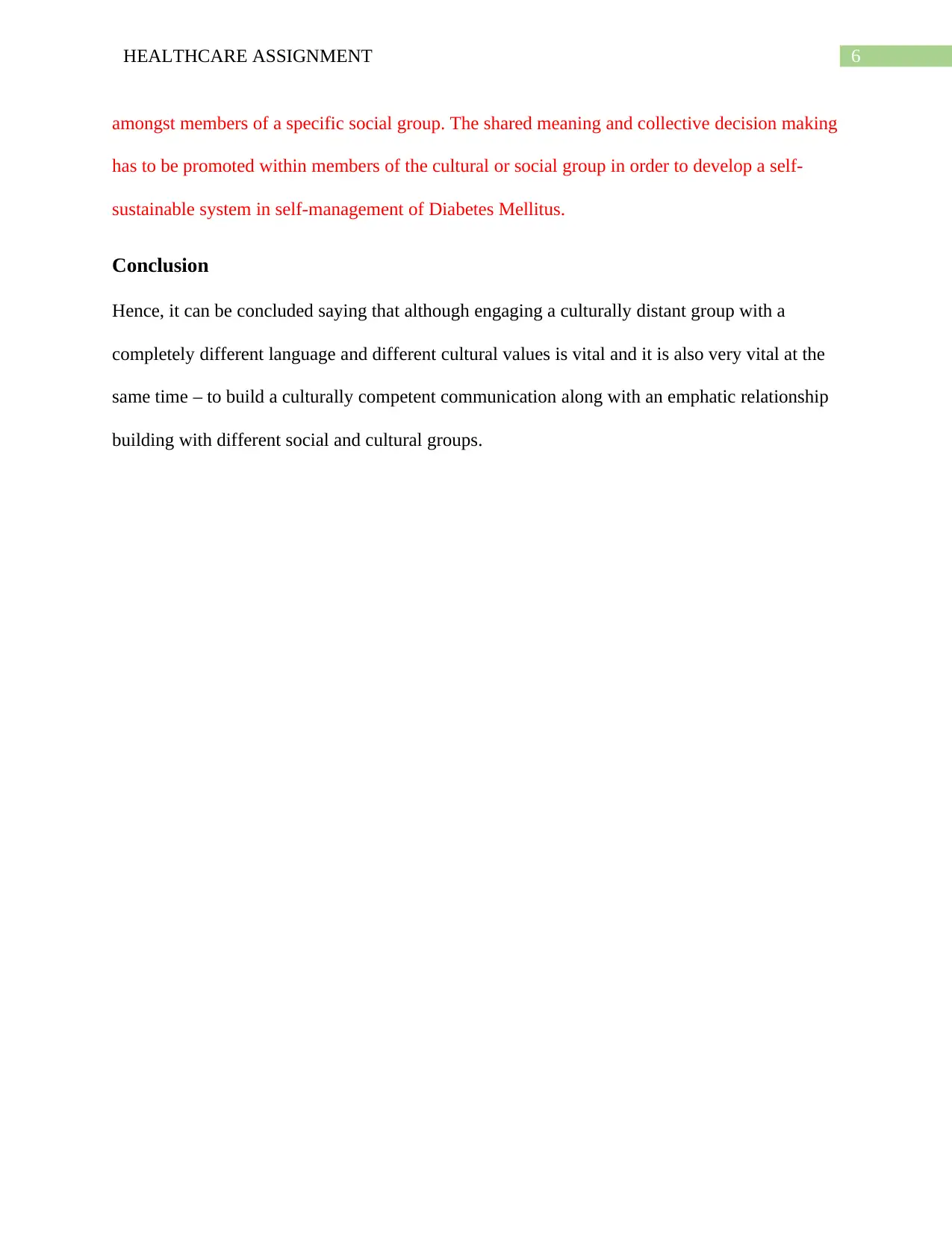
6HEALTHCARE ASSIGNMENT
amongst members of a specific social group. The shared meaning and collective decision making
has to be promoted within members of the cultural or social group in order to develop a self-
sustainable system in self-management of Diabetes Mellitus.
Conclusion
Hence, it can be concluded saying that although engaging a culturally distant group with a
completely different language and different cultural values is vital and it is also very vital at the
same time – to build a culturally competent communication along with an emphatic relationship
building with different social and cultural groups.
amongst members of a specific social group. The shared meaning and collective decision making
has to be promoted within members of the cultural or social group in order to develop a self-
sustainable system in self-management of Diabetes Mellitus.
Conclusion
Hence, it can be concluded saying that although engaging a culturally distant group with a
completely different language and different cultural values is vital and it is also very vital at the
same time – to build a culturally competent communication along with an emphatic relationship
building with different social and cultural groups.
Paraphrase This Document
Need a fresh take? Get an instant paraphrase of this document with our AI Paraphraser
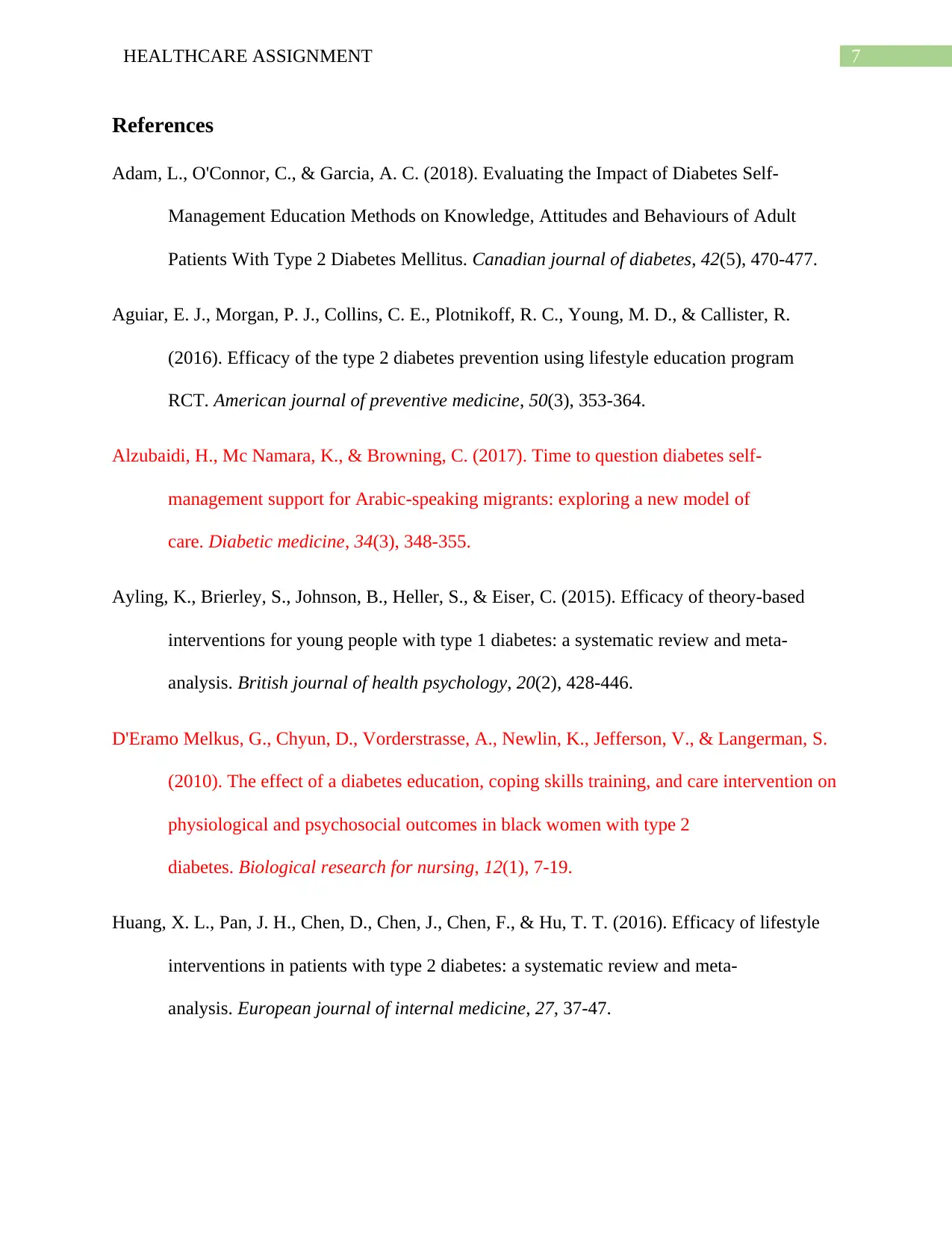
7HEALTHCARE ASSIGNMENT
References
Adam, L., O'Connor, C., & Garcia, A. C. (2018). Evaluating the Impact of Diabetes Self-
Management Education Methods on Knowledge, Attitudes and Behaviours of Adult
Patients With Type 2 Diabetes Mellitus. Canadian journal of diabetes, 42(5), 470-477.
Aguiar, E. J., Morgan, P. J., Collins, C. E., Plotnikoff, R. C., Young, M. D., & Callister, R.
(2016). Efficacy of the type 2 diabetes prevention using lifestyle education program
RCT. American journal of preventive medicine, 50(3), 353-364.
Alzubaidi, H., Mc Namara, K., & Browning, C. (2017). Time to question diabetes self‐
management support for Arabic‐speaking migrants: exploring a new model of
care. Diabetic medicine, 34(3), 348-355.
Ayling, K., Brierley, S., Johnson, B., Heller, S., & Eiser, C. (2015). Efficacy of theory‐based
interventions for young people with type 1 diabetes: a systematic review and meta‐
analysis. British journal of health psychology, 20(2), 428-446.
D'Eramo Melkus, G., Chyun, D., Vorderstrasse, A., Newlin, K., Jefferson, V., & Langerman, S.
(2010). The effect of a diabetes education, coping skills training, and care intervention on
physiological and psychosocial outcomes in black women with type 2
diabetes. Biological research for nursing, 12(1), 7-19.
Huang, X. L., Pan, J. H., Chen, D., Chen, J., Chen, F., & Hu, T. T. (2016). Efficacy of lifestyle
interventions in patients with type 2 diabetes: a systematic review and meta-
analysis. European journal of internal medicine, 27, 37-47.
References
Adam, L., O'Connor, C., & Garcia, A. C. (2018). Evaluating the Impact of Diabetes Self-
Management Education Methods on Knowledge, Attitudes and Behaviours of Adult
Patients With Type 2 Diabetes Mellitus. Canadian journal of diabetes, 42(5), 470-477.
Aguiar, E. J., Morgan, P. J., Collins, C. E., Plotnikoff, R. C., Young, M. D., & Callister, R.
(2016). Efficacy of the type 2 diabetes prevention using lifestyle education program
RCT. American journal of preventive medicine, 50(3), 353-364.
Alzubaidi, H., Mc Namara, K., & Browning, C. (2017). Time to question diabetes self‐
management support for Arabic‐speaking migrants: exploring a new model of
care. Diabetic medicine, 34(3), 348-355.
Ayling, K., Brierley, S., Johnson, B., Heller, S., & Eiser, C. (2015). Efficacy of theory‐based
interventions for young people with type 1 diabetes: a systematic review and meta‐
analysis. British journal of health psychology, 20(2), 428-446.
D'Eramo Melkus, G., Chyun, D., Vorderstrasse, A., Newlin, K., Jefferson, V., & Langerman, S.
(2010). The effect of a diabetes education, coping skills training, and care intervention on
physiological and psychosocial outcomes in black women with type 2
diabetes. Biological research for nursing, 12(1), 7-19.
Huang, X. L., Pan, J. H., Chen, D., Chen, J., Chen, F., & Hu, T. T. (2016). Efficacy of lifestyle
interventions in patients with type 2 diabetes: a systematic review and meta-
analysis. European journal of internal medicine, 27, 37-47.
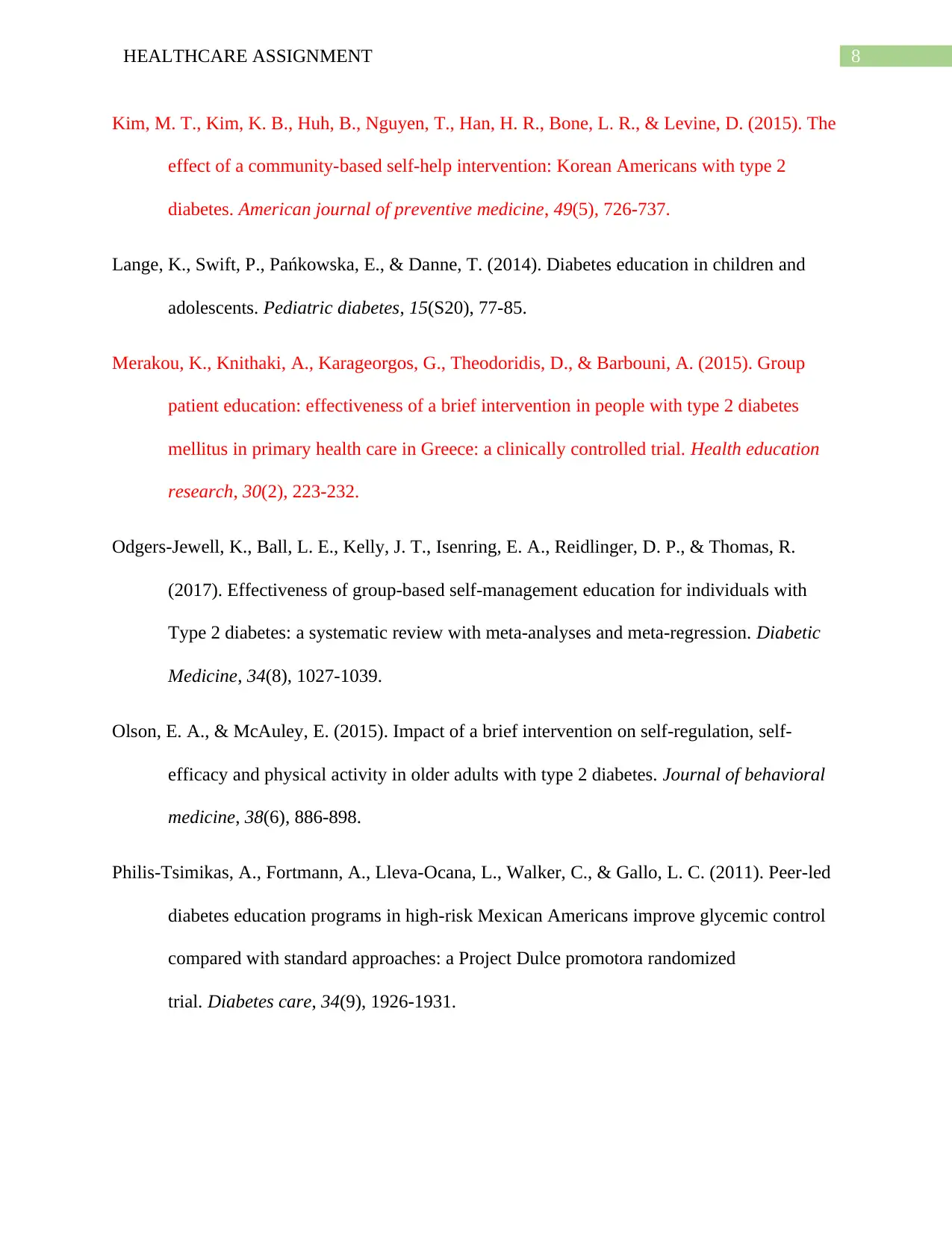
8HEALTHCARE ASSIGNMENT
Kim, M. T., Kim, K. B., Huh, B., Nguyen, T., Han, H. R., Bone, L. R., & Levine, D. (2015). The
effect of a community-based self-help intervention: Korean Americans with type 2
diabetes. American journal of preventive medicine, 49(5), 726-737.
Lange, K., Swift, P., Pańkowska, E., & Danne, T. (2014). Diabetes education in children and
adolescents. Pediatric diabetes, 15(S20), 77-85.
Merakou, K., Knithaki, A., Karageorgos, G., Theodoridis, D., & Barbouni, A. (2015). Group
patient education: effectiveness of a brief intervention in people with type 2 diabetes
mellitus in primary health care in Greece: a clinically controlled trial. Health education
research, 30(2), 223-232.
Odgers‐Jewell, K., Ball, L. E., Kelly, J. T., Isenring, E. A., Reidlinger, D. P., & Thomas, R.
(2017). Effectiveness of group‐based self‐management education for individuals with
Type 2 diabetes: a systematic review with meta‐analyses and meta‐regression. Diabetic
Medicine, 34(8), 1027-1039.
Olson, E. A., & McAuley, E. (2015). Impact of a brief intervention on self-regulation, self-
efficacy and physical activity in older adults with type 2 diabetes. Journal of behavioral
medicine, 38(6), 886-898.
Philis-Tsimikas, A., Fortmann, A., Lleva-Ocana, L., Walker, C., & Gallo, L. C. (2011). Peer-led
diabetes education programs in high-risk Mexican Americans improve glycemic control
compared with standard approaches: a Project Dulce promotora randomized
trial. Diabetes care, 34(9), 1926-1931.
Kim, M. T., Kim, K. B., Huh, B., Nguyen, T., Han, H. R., Bone, L. R., & Levine, D. (2015). The
effect of a community-based self-help intervention: Korean Americans with type 2
diabetes. American journal of preventive medicine, 49(5), 726-737.
Lange, K., Swift, P., Pańkowska, E., & Danne, T. (2014). Diabetes education in children and
adolescents. Pediatric diabetes, 15(S20), 77-85.
Merakou, K., Knithaki, A., Karageorgos, G., Theodoridis, D., & Barbouni, A. (2015). Group
patient education: effectiveness of a brief intervention in people with type 2 diabetes
mellitus in primary health care in Greece: a clinically controlled trial. Health education
research, 30(2), 223-232.
Odgers‐Jewell, K., Ball, L. E., Kelly, J. T., Isenring, E. A., Reidlinger, D. P., & Thomas, R.
(2017). Effectiveness of group‐based self‐management education for individuals with
Type 2 diabetes: a systematic review with meta‐analyses and meta‐regression. Diabetic
Medicine, 34(8), 1027-1039.
Olson, E. A., & McAuley, E. (2015). Impact of a brief intervention on self-regulation, self-
efficacy and physical activity in older adults with type 2 diabetes. Journal of behavioral
medicine, 38(6), 886-898.
Philis-Tsimikas, A., Fortmann, A., Lleva-Ocana, L., Walker, C., & Gallo, L. C. (2011). Peer-led
diabetes education programs in high-risk Mexican Americans improve glycemic control
compared with standard approaches: a Project Dulce promotora randomized
trial. Diabetes care, 34(9), 1926-1931.
⊘ This is a preview!⊘
Do you want full access?
Subscribe today to unlock all pages.

Trusted by 1+ million students worldwide
1 out of 9
Related Documents
Your All-in-One AI-Powered Toolkit for Academic Success.
+13062052269
info@desklib.com
Available 24*7 on WhatsApp / Email
![[object Object]](/_next/static/media/star-bottom.7253800d.svg)
Unlock your academic potential
Copyright © 2020–2025 A2Z Services. All Rights Reserved. Developed and managed by ZUCOL.





